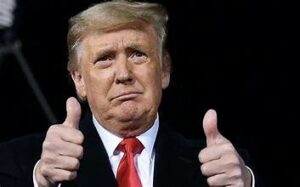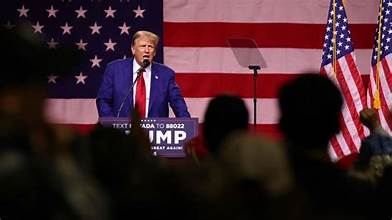Supreme Court sides with Trump sends immunity case back to lower court
Supreme Court rules ex-presidents have broad immunity, dimming chance of a pre-election Trump trial
The Supreme Court has ruled for the first time that former presidents have broad immunity from criminal prosecution for official acts, extending the delay in the Washington criminal case against ex-President Donald Trump.
WASHINGTON (AP) — The Supreme Court on Monday ruled for the first time that former presidents have broad immunity from prosecution, extending the delay in the Washington criminal case against Donald Trump on charges he plotted to overturn his 2020 presidential election loss and all but ending prospects the former president could be tried before the November election.
In a historic 6-3 ruling, the court’s conservative majority, including the three justices appointed by Trump, narrowed the case against him and returned it to the trial court to determine what is left of special counsel Jack Smith’s indictment.
The White House said President Joe Biden would speak on the ruling Monday night.
The ruling reflected a muscular view of presidential power, and left dissenting judges to criticize it as undermining a core democratic principle that no person is above the law.

The court’s decision highlighted how the justices have been thrust into an impactful role in the November presidential election. Earlier, they had rejected efforts to bar him from the ballot because of his actions following the 2020 election. The court last week also limited an obstruction charge faced by Trump and used against hundreds of his supporters who stormed the Capitol on Jan. 6, 2021. The split among the justices also in many ways mirrored the political divide in the country.
“Under our constitutional structure of separated powers, the nature of presidential power entitles a former president to absolute immunity from criminal prosecution for actions within his conclusive and preclusive constitutional authority,” Chief Justice John Roberts wrote for the court. “And he is entitled to at least presumptive immunity from prosecution for all his official acts. There is no immunity for unofficial acts.”
The chief justice insisted that the president “is not above the law.” But in a fiery dissent for the court’s three liberals, Justice Sonia Sotomayor wrote, “In every use of official power, the President is now a king above the law.”
Reading from her opinion in the courtroom, Sotomayor said, “Because our Constitution does not shield a former president from answering for criminal and treasonous acts, I dissent.” Sotomayor said the decision “makes a mockery of the principle, foundational to our Constitution and system of government, that no man is above the law.”
The protection afforded presidents by the court, she said, “is just as bad as it sounds, and it is baseless.”
Trump posted in all capital letters on his social media network shortly after the decision was released: “BIG WIN FOR OUR CONSTITUTION AND DEMOCRACY. PROUD TO BE AN AMERICAN!”
Smith’s office declined to comment on the ruling.
Biden’s campaign said in a statement that the ruling “doesn’t change the facts” about the events of Jan. 6.
Senate Majority Leader Chuck Schumer denounced the ruling as “a disgraceful decision,” made with the help of the three justices that Trump appointed.
“It undermines SCOTUS’s credibility and suggests political influence trumps all in our courts today,” the New York Democrat said on X.
The justices knocked out one aspect of the indictment. The opinion found Trump is “absolutely immune” from prosecution for alleged conduct involving discussions with the Justice Department.
Trump is also “at least presumptively immune” from allegations that he tried to pressure Vice President Mike Pence to reject certification of Democrat Joe Biden’s electoral vote win on Jan. 6, 2021. Prosecutors can try to make the case that Trump’s pressure on Pence still can be part of the case against him, Roberts wrote.
The court directed a fact-finding analysis on one of the more striking allegations in the indictment — that Trump participated in a scheme to enlist fake electors in battleground states won by Biden who would falsely assert that Trump had won. Both sides had dramatically different interpretations as to whether that effort could be construed as official, and the conservative justices said determining which side is correct would require additional analysis at the trial court level.
Roberts’ opinion further restricted prosecutors by prohibiting them from using any official acts as evidence in trying to prove a president’s unofficial actions violated the law. One example not relevant to this case but which came up in arguments was the hypothetical payment of a bribe in return for an ambassadorial appointment.
Under Monday’s decision, a former president could be prosecuted for accepting a bribe, but prosecutors could not mention the official act, the appointment, in their case.
Justice Amy Coney Barrett, who joined the rest of Roberts’ opinion, parted company on this point. “The Constitution does not require blinding juries to the circumstances surrounding conduct for which Presidents can be held liable,” Barrett wrote.
She also described as unnecessary the analysis of the fake electors claim. “I see no plausible argument for barring prosecution of that alleged conduct,” Barrett wrote.
The work of figuring out how to proceed will fall to U.S. District Judge Tanya Chutkan, who would preside over Trump’s trial.
Trump still could face a trial, said Notre Dame law professor Derek Muller. “But the fact remains that it is almost impossible to happen before the election.”
David Becker, an election law expert and the executive director of the nonprofit Center for Election Innovation and Research, called the breadth of immunity granted to Trump “incredibly broad” and “deeply disturbing.”
“Almost anything that a president does with the executive branch is characterized as an official act,” he said on a call with reporters following the ruling. He said that “for any unscrupulous individual holding the seat of the Oval Office who might lose an election, the way I read this opinion is it could be a roadmap for them seeking to stay in power.”
The ruling was the last of the term, and it came more than two months after the court heard arguments, far slower than in other epic high court cases involving the presidency, including the Watergate tapes case.
The Republican former president has denied doing anything wrong and has said this prosecution and three others are politically motivated to try to keep him from returning to the White House.
In May, Trump became the first former president to be convicted of a felony, in a New York court. He was found guilty of falsifying business records to cover up a hush money payment made during the 2016 presidential election to a porn actor who says she had sex with him, which he denies. He still faces three other indictments.
Smith is leading the two federal inquiries of the former president, both of which have led to criminal charges. The Washington case focuses on Trump’s alleged efforts to overturn the 2020 election after he lost to Biden. The case in Florida revolves around the mishandling of classified documents. A separate case, in Georgia, also turns on Trump’s actions after his defeat in 2020.
If Trump’s Washington trial does not take place before the 2024 election and he is not given another four years in the White House, he presumably would stand trial soon thereafter.
But if he wins, he could appoint an attorney general who would seek the dismissal of this case and the other federal prosecution he faces. He could also attempt to pardon himself if he reclaims the White House. He could not pardon himself for the conviction in state court in New York.
The Supreme Court that heard the case included three justices appointed by Trump — Neil Gorsuch, Brett Kavanaugh and Barrett — and two justices who opted not to step aside after questions were raised about their impartiality.
Thomas’ wife, Ginni, attended the rally near the White House where Trump spoke on Jan. 6, 2021, though she did not go the Capitol when a mob of Trump supporters attacked it soon after. Following the 2020 election, she called the outcome a “heist” and exchanged messages with White House chief of staff Mark Meadows, urging him to stand firm with Trump as he falsely claimed that there was widespread election fraud.
Justice Samuel Alito said there was no reason for him to step aside from the cases following reports by The New York Times that said flags similar to those carried by the Jan. 6 rioters flew above his homes in Virginia and on the New Jersey shore. His wife, Martha-Ann Alito, was responsible for flying both the inverted American flag in January 2021 and the “Appeal to Heaven” banner in the summer of 2023, he said in letters to Democratic lawmakers responding to their recusal demands.

Before the Supreme Court got involved, a trial judge and a three-judge appellate panel had ruled unanimously that Trump could be prosecuted for actions undertaken while in the White House and in the run-up to Jan. 6.
Chutkan ruled against Trump’s immunity claim in December. In her ruling, Chutkan said the office of the president “does not confer a lifelong ‘get-out-of-jail-free’ pass.”
___
Associated Press


